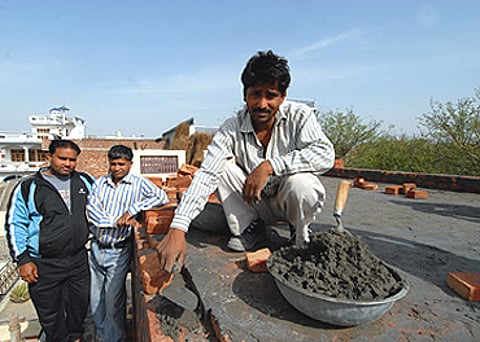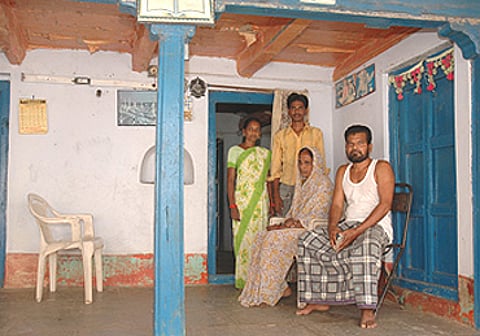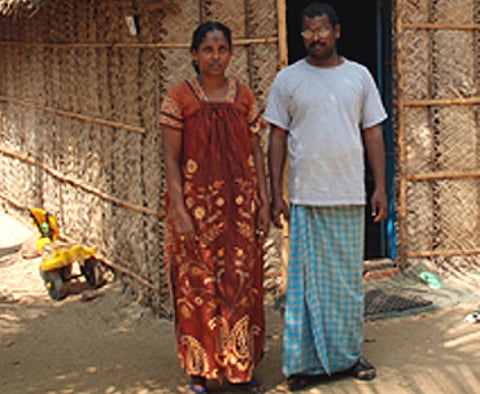The Next Flight Home
The death of the Gulf boom could prove to be a socio-economic crisis for some states
In faraway Punjab, the Gulf meltdown has already had a trickledown effect on local businesses like taxi services, travel agencies and the construction business. Business is down by 50 per cent because no one is travelling within the state. Neither are they going back to their jobs abroad. Even investments for low income housing have come down. While the rich NRIs are in the West, Punjab has a fair share of unskilled/semi-skilled workers in the Gulf. Says Jasvir Singh, a carpenter from Mahil Gehlan village near Jalandhar: "The construction boom is over, companies have closed down, the banks do not have money and people like us are out of work." He returned after working with a construction company in Sharjah for 12 years. "Around 18-20 men have returned in my village alone. Most of us are daily-wagers now," he adds.
Sixty-five-year-old Joginder Singh Bhangalia lived and worked for 35 years in Dubai. He runs a construction and transport company in partnership with an Arab in Dubai which together employs around 500 Indian workers. From his house in Phagwara, he tells Outlook: "The last six months have been so bad for us, I am now in the process of shifting my business to India and am looking for construction projects near Punjab. We don’t want to stay there anymore." He estimates that over two lakh Punjabis in the Gulf countries may lose their jobs in the months to come.

For 12 years, I worked hard as a carpenter in Sharjah. Things were fine. The troubles started in July last year when I was not paid part of my salary. I quit and started working elsewhere but I had to return as my visa was cancelled (my new employer did not sponsor my visa). Companies are not paying full wages these days, forcing people to look for options elsewhere. The construction boom is over. Firms have shut down, banks do not have money and many people like us are out of work. Around 20 of my villagers have returned...most of us are working as daily-wagers now."
While alarm bells are yet to go off on a possible exodus, flights from the Middle East to the three international airports in Kerala have started showing a "reverse flow". It could mean a flood of job-seekers into a state already facing a massive unemployment problem on top of the economic downturn.
The returnees are mostly semi-skilled workers engaged in the real estate/construction industry. Many of them pledged their property and jewellery to pay labour contractors upwards of Rs 1 lakh for job visas. In AP, most of the labour working in the Gulf are from the backward regions of Telangana—Karimnagar, Nizamabad and Adilabad districts. Sheikh Chand Pasha, who himself is a Gulf returnee, has been helping villagers handle unscrupulous agents and moneylenders through his Gulf Badhethula Seva Sansthan (Welfare of Gulf Returnees Forum). He says the state government needs to take up the issue before it gets out of hand. "The people returning from the Gulf are shattered emotionally and financially. It’s not just that they have lost their jobs. They are also harassed by the moneylenders," he says.

Ichose to come back on February 1 after going to Dubai last June to join an ad agency. My company, like many others in Dubai, was not doing well. I was lucky I quit early. Others have not been so lucky. The recession has had a serious effect in Dubai. Cars are being abandoned at airports with their keys in them as migrants head back home. Only 35 per cent of the clients at the agency where I worked promised to clear contracts, while the rest said they would be able to decide only in the last quarter of 2009."
The Gulf dream soured towards the end of 2008. Suddenly, news of retrenchment and workers becoming redundant began doing the rounds among the expat community. Major contractors were shelving projects. One was the Al Dana, an artificial island off the coast of Ras al Khaima, UAE. Hundreds of workers, support staff and engineers who were expecting work there, after completing a similar project, Al Marjan, have been retrenched. V. Yesudasan was a quality assistant at the Al Marjan project. Now he’s back home in Sakthikulangara in the southern Kollam district, some 75 km from Thiruvananthapuram.
Cases of returnees abound in Gulf pockets across Kerala. Jyothish Kumar, a civil engineer from Thrissur district, recently quit his job in Doha to join a company in Dubai. He was getting 12,500 dirhams (Rs 1.6 lakh) a month and was living with his family in Dubai when his company folded. He’s among many professionals who are back and have to start the job hunt all over again. But it’s tough finding a job in Kerala because fresh graduates are available for a pittance. Says K.V. Shamsudheen of the Pravasi Bandhu Welfare Trust, an ngo looking after the interests of expat Keralites: "It’s a frightening scenario...it’s not a distant possibility but an impending reality now. Unless Kerala innovates and puts some schemes in place, we will be up against an unprecedented crisis."

My husband worked as a carpenter with a Pakistani firm in Dubai for over a decade but a month ago his services were terminated abruptly. I was undergoing treatment for partial speech impairment and my condition has deteriorated ever since he returned. He used to earn Rs 14,300 per month but most of that money has been used to get our daughters married and repay loans. The company has not paid him a month’s salary. Neither has it reimbursed him for the holidays he worked on for 12 years. I have taken up a job in a beedi factory for Rs 600 per month. My son is unemployed too."
The Kerala government, for its part, has announced Rs 100 crore for a special self-employment scheme. Another Rs 10 crore has been set apart for giving relief to the most distressed among the returnees. But more funds will be required if the economic situation in the Gulf worsens and returnees come in large numbers, as feared by minister Isaac.
Estimates from neighbouring Tamil Nadu also point to a crisis but not of the dimensions as seen in Kerala and AP. Though some districts will be affected, there is no sense of alarm in the government as yet. But stories do surface. Anwar Pasha is back home in Kilakarai in Ramanathapuram district after a three-year stint at a construction firm in Dubai. His employer had asked him to go home on long leave. Pasha still has to get pay for three months, but is unlikely to get the money now (he’s now heard that his employer is laying off many).

Ihave been in Dubai since September 2007, working as a plumber. I was paid Rs 27,300 per month. With the money, I used to manage about Rs 18,000 per month back home to my wife to repay a loan of Rs 1.65 lakh. I had taken it to get my visa from a local contractor. My luck ran out in December when I lost my job. I tried to find another job for an entire month, even one that paid less, but failed and returned on February 18. I am repaying a housing loan too and need Rs 2.5 lakh for that. I work as a deckhand on a fishing boat now but I hope Dubai will soon find its glitter again. And that poor people like me will be able to go back and earn a decent living."
Dubai was the city of dreams for the average labourer from the southern districts of Tamil Nadu, but not anymore. R. Sekar, protector of emigrants, says records show a 40 per cent decline in the numbers of those applying for ecr (emigration clearance required) as of December ’08. Sekar, also a director at the ministry of overseas Indian affairs, said the trend was visible since July ’08. "We have seen a drop of 40 per cent in the number of applicants to Dubai and the Gulf nations in the second half of 2008, as compared to 15 per cent in 2007. The global recession, unpaid salaries and poor living conditions could be the reasons for the decline," he says. A recruiter says labourers are back to wanting to go to Singapore and Malaysia because at least salaries are assured every month.
The real impact of all this will be felt in Kerala. With 20-odd lakh Malayalees in the Gulf, the government is hoping the returnees problem doesn’t grow into a socio-economic crisis. Chief minister V.S. Achuthanandan says the harsh part is that of the Rs 30,000 crore in remittances every year, the lion’s share comes from blue-collar workers.
Overseas remittances are equivalent to 20 per cent of the net state domestic product. In fact, the value of these remittances exceeds the value of income originating in the state’s primary as well as manufacturing sector. Some 42 per cent of the NRKs (non-resident Keralites) work in the UAE while the share of the Middle East in the NRK population is 89 per cent.
A major problem with returnees would be their economic reintegration. Most of them were doing jobs abroad they wouldn’t normally do in Kerala. Once back, they’ll be loath to do an electrician or plumber’s job. Worse is the case with the graduates/post-graduates. Finding suitable jobs is a bleaker-than-ever proposition. And that holds true for all ‘overseas’ workers returning home across India.
By John Mary, Chander Suta Dogra, Venugopal Pillai and Pushpa Iyengar
Tags